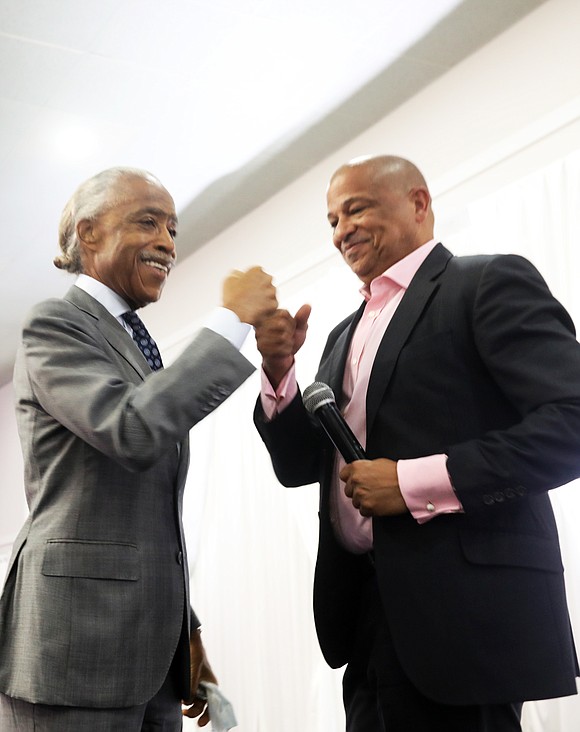Casino referendum fails in close no vote
Jeremy M. Lazarus | 11/4/2021, 6 p.m.

The people have spoken: Richmond will not become a gambling Mecca.
In another shock to the city’s political leadership, voters rejected the $565 million casino, hotel, park and entertainment center that Black media giant Urban One had proposed to develop next door to the Philip Morris tobacco factory in South Side off the Bells Road exit of Interstate 95.
The still unofficial tally from Tuesday’s election shows 39,824 no votes, or 51.1 percent, to 37,999 yes votes or 48.8 percent. While Mayor Levar M. Stoney and others expressed disappointment at the defeat, others were celebrating.
“We won. Amazing upset!” Paul Goldman, a political strategist who crusaded against the casino, wrote after the results came in. Quinton Robbins, political director for the community organizing group Richmond For All, said the win “puts a stop to politicians using exploitative economic development to further their political careers.”
In a view that resonated with voters, he stated that the casino “will not grow our city’s economy, but instead will rob working people of their livelihood. For the casino to succeed, Richmond residents will need to lose the bulk of $300 million a year. Casinos will not be our salvation.”
Alfred C. Liggins III, president and CEO of Urban One, said he and his mother, Cathy Hughes, the company’s chair, “accept the will of the Richmond residents.”
Describing himself as “extremely disappointed,” he called the casino project’s defeat a “huge, missed opportunity for Richmond residents to have a tourist attraction that would have provided the financial resources to improve schools and roads as well as enrich the lives of its citizens.”
He said Urban One “has been a part of the fabric of Richmond for the last 22 years, and we will continue our tradition of serving the community.” The media giant has 63 radio stations, including five in Richmond.
During the campaign, Mr. Liggins touted the project’s benefits, including the creation of 1,500 jobs paying an average of $55,000 apiece and the $500 million in new revenue the city would gain in the first10 years. He has indicated that he might ask the General Assembly to allow a nearby locality to Richmond to consider a casino.
Richmond is the only city to reject a casino among the five localities selected by the General Assembly to have a casino. In November 2020, voters in Norfolk, Portsmouth, Danville and Bristol overwhelmingly backed plans for gambling resorts in their communities.
The vote was a huge disappointment for Mayor Levar M. Stoney and his administration that had strongly backed the proposal as a win for the city. The project also had the support of at least eight of the nine members of City Council.
According to the state Department of Elections’ unofficial results, Urban One and its partners who had pumped more than $2 million into its campaign took an early lead, with majority support from those who had voted early by mail and in person.
The casino also won outright majorities in the city’s 8th District where it was to be located, as well as in the 6th and 9th districts and appeared to have narrowly won the 7th District, where four of the seven precincts provided majority support.
The project lost after no voters piled up huge margins in much of the city west of U.S. 1. Rejection voters swept the 10 precincts in the 1st District and the eight precincts in the 2nd District; claimed seven of the eight precincts in the 4th District and captured five of the seven precincts in the 5th District. The 3rd District’s 10 precincts split 5-5.
“From the beginning, we said the people would decide,” Mayor Stoney stated after the vote. “They have spoken, and we must respect their decision.
Heading into the election, the casino forces appeared to have the upper hand. Three weeks before the vote, a poll commissioned by opponents indicated that 60 percent of voters were likely to support the development.
With support from former grocer and banker James Ukrop and his own resources, Mr. Goldman said he pushed to create ads for social media, particularly YouTube, featuring statements from a diverse group of residents, ranging from Viola O. Baskerville, a former state secretary of administration and former member of the House of Delegates; to activists Chelsea Higgs Wise and Allan-Charles Chipman, School Board member Kenya Gibson and former City Councilman Parker C. Agelasto.
He said the ads, which were posted just a few days before the vote, garnered more than 2 million views and appeared to reach people who are wedded to their cellphones and ignore traditional TV, radio and direct mail ads, which were heavily relied on by the casino campaign.







